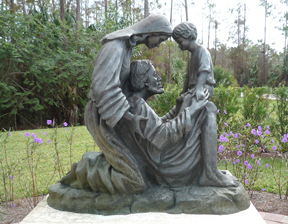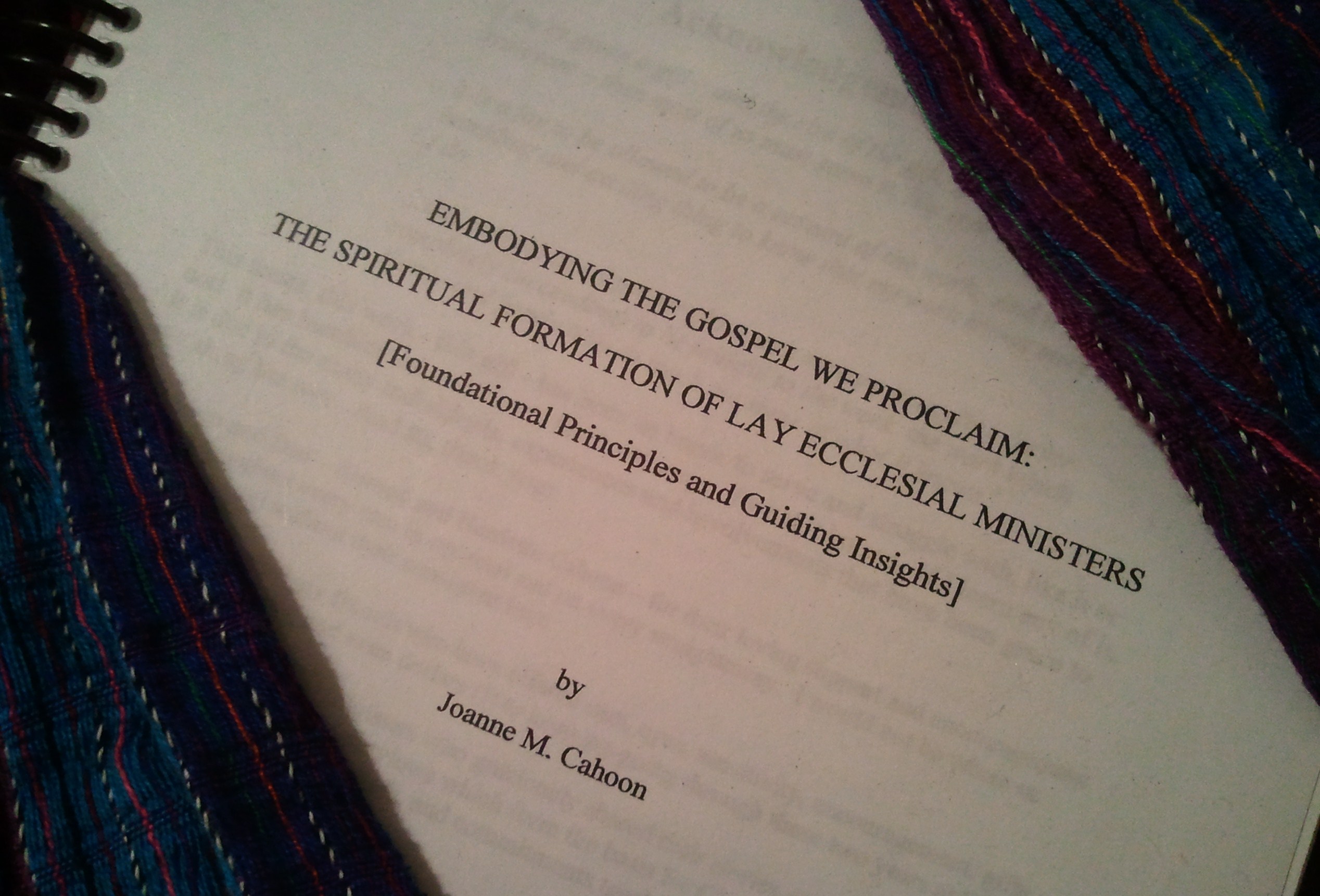Most of us make decisions over a lifetime about when to stay or go – in a job, a relationship, a vocational path, a degree program. We’ve heard info about healthy/unhealthy relationships, boundaries, the color of our parachutes, the bliss we are to follow, the love we deserve to find. Valuing all of what we’ve learned in these areas, I wonder if we give sufficient attention to perseverance, endurance and staying power.
I have been intrigued (again!) over the last months with the life experiences of St. John of the Cross. This Spanish 17th century saint and doctor of the church is a fascinating man, a poet and pray-er, a leader and guidance-giver. But one of the most interesting things about him for me is his staying.
 Simplifying greatly, he was an agent of reform in the Carmelite religious order of which he was a part. As such, he gained great enemies within his own brothers. This enmity found quite concrete expression when his brothers imprisoned him for months – clearly intending his demise. He was in the dark, in small space, with insufficient light, poor and too-little food, isolated, and threatened by deliberately staged periodic conversations outside his door. His hope, his physical well-being, his mental and spiritual faculties – all suffered drastically. And out of this experience he eventually crafted and shared some of the most amazing poetry and prose on the relationship of love with God that has ever been written. But this ‘rest of the story’ was certainly not evident in the dark, dark days John spent imprisoned, though it prompted an inward and outward journey that was seeded then.
Simplifying greatly, he was an agent of reform in the Carmelite religious order of which he was a part. As such, he gained great enemies within his own brothers. This enmity found quite concrete expression when his brothers imprisoned him for months – clearly intending his demise. He was in the dark, in small space, with insufficient light, poor and too-little food, isolated, and threatened by deliberately staged periodic conversations outside his door. His hope, his physical well-being, his mental and spiritual faculties – all suffered drastically. And out of this experience he eventually crafted and shared some of the most amazing poetry and prose on the relationship of love with God that has ever been written. But this ‘rest of the story’ was certainly not evident in the dark, dark days John spent imprisoned, though it prompted an inward and outward journey that was seeded then.
What intrigues me is that, upon his eventual and daring escape, he did not leave his brothers. He did not leave the order. What gave him the power to stay?
There’s an oft-recounted story of a thief who had a dream one night of a monk outside town by a small lake. In the dream, the monk took out of his deep habit pocket a gem of great price wrapped in cloth. The thief woke and, inspired, went out of town in the darkness to the lake. There he found the monk from his dream and told him he wanted what was in his pocket. The monk reached deep within the brown folds, surprised to find a lump of cloth. The monk pulled it out and unwrapped the cloth. Both men gazed on the gem – the thief with avarice, the monk in surprise. The monk caught the thief’s eyes and, reaching his out full hand to him, asked, “Do you want this?” The thief grabbed it and went home, staying up all night staring at the gem. In the morning, the thief wrapped the gem back in the cloth and returned to the lake. The monk was still there, and the thief approached him. “Here,” the thief said to the monk, as he reached forward with the clothed gem. The monk looked up, taking the bundle, asking, “You no longer want it?” The thief paused, looking at the monk carefully, and said, “No, I don’t want that. Instead, I want the power that gave you the ability to give it to me.”
There is something in the character of John’s staying that prompts the same kind of wonder the thief experienced. What gave John the power to stay, when he was clearly not only valued poorly by some, but wished the worst? This staying was not at all passive, or blind. There is a power in his choice, and the ripples it makes in his life. Putting the intervening biographical timeline aside, toward the end of his rather short life he was again in a situation where a superior treated him in illness without respect, and in such a way that clearly impacted his health negatively. In all of these circumstances, John exhibited a power to be with that was not a victim-codependent-unable-to-stand-up-for-himself-too-facile-21st-century-diagnosis of him. He was utterly strong in this staying. What is his secret? What gave him the ability to do so? Is this about courage? The action of someone we somehow suspect behaves in a way beyond us? What does it say to us? 
An important theme in John’s writing is the need to create space for the Beloved (God, in Christ) as an action appropriate for the seeker. It is a seeking of the nada, the nothing, that was not for the sake of nothing, but for the sake of everything. But the everything was not John’s (and is not ours) to create. The everything is a person – the Beloved. John seems to have had staying power simply because it was not his power – it was God’s. In that power John learned over time not to place his focus only on his brothers’ poor (and much worse than poor!) actions. It was on the Beloved one, on the love story he lived with; the love story he encouraged those he directed to engage; and he believed that the circumstances of his daily life were the wallpaper on the wall in the room, so to speak. They were important, but not the essential. If anything, they offered more opportunity and context to see. He was imprisoned. But he was loved. He was treated horribly. But he was held safely. He had every reason to hate or run or scream, but he turned and trusted and leaned on the love that was beyond him to provide what he needed to act as seemed right in a moment, knowing too that he failed at times.
 There is something fascinating about the storied monk’s response to the thief. And there is something fascinating about people of faith. John Shea told us this powerfully in his now-old book The Spirit Master. John of the Cross did not choose abuse or imprisonment. He escaped from them. He also accepted the gifts he had because of them – in his writings and ways of being with others. He recognized that he learned things in those circumstances he might otherwise not have learned, or held onto with the same tenacity as truth that would impact his own and others’ lives – effecting some of his time and since, through his writings and witness.
There is something fascinating about the storied monk’s response to the thief. And there is something fascinating about people of faith. John Shea told us this powerfully in his now-old book The Spirit Master. John of the Cross did not choose abuse or imprisonment. He escaped from them. He also accepted the gifts he had because of them – in his writings and ways of being with others. He recognized that he learned things in those circumstances he might otherwise not have learned, or held onto with the same tenacity as truth that would impact his own and others’ lives – effecting some of his time and since, through his writings and witness.
Perhaps you and I can see a similar pattern as we look over seasons and events in our own lives.
John’s staying power was not his power. It was a power he found when he called out to God, “Where have you hidden?” (not too different from Jesus’ call, rooted in the psalms, “O God, my God, why have you forsaken me?”). John’s question during his imprisonment was raw and real, wrapped in hurting flesh and anguished spirit and abandonment by the very community he had given all to as they lived out a particular way of the Christian life together. Still, in his powerlessness, he found a power that was not his. He spoke of love provided by God to love with – gained when the nada (nothingness) was filled with God. He taught of this as he lived it again in his last long suffering illnesses.
I do not discount the need to leave untenable and unhealthy places and situations. In fact, I strongly affirm the need to choose. Discernment in these situations is essential, especially as our vision is so impacted by the experiences’ intensity. God does not wish our destruction on any level. Still, I recognize the challenge that John’s witness represents. In a life commitment he had made he lived out, in trust, a power to stay and be faithful that is a mystery. His way of staying attracts my attention. I find it fascinating. He was healthy and whole in his spirituality and theology, and real in his human journey. And somehow this staying was utterly right and absolutely the context for his creativity and sharing. It is in this crucible that he learned to be attentive to how much he was loved by the Beloved, and to turn his attention there. I wonder at his gratitude for what he suffered, and his peace with it, over time. And I celebrate the way he lived fidelity.
May you and I be granted an ability to look to the God who loves us first, the Beloved who calls us Beloved in turn, and find the staying power we need in our experiences of certain circumstances and crucibles in life. Some we cannot leave – they just are, and ‘happen’ to us. Some we leave after a time due to choice or situation. Others we choose to persevere within. John left imprisonment (for his life!), yet carried and stayed with its tutoring long after. He also needed to heal, integrate and write too while he continued his ministries. We too need to be attentive to the needs we have around deeply disturbing or unsettling seismic shifts: stay or go. This does not negate our ability to stay, but may change our means of doing so.
The power to stay with or in an experience, as we are invited to learn and grow wherever we are, is not one we can seek to manufacture in ourselves. We can let the unsettledness remind us how utterly empty and poor we are. And remember God’s humility in becoming poor and empty with us – in a stable and on a cross – in love. From where we stand as creatures before the Creator, we can seek an encounter that is real – whether or not it is felt – with the Beloved, and ask discernment and the companionship of Christ and his staying power. And we can, with John, choose not to live in what was, but in what now is with new eyes and tutored hearts.
For your reflection, I offer four short scriptural excerpts on endurance, with question/s to ponder about staying’s power and staying power! St. John of the Cross, pray for us!
Exodus 18:8: Describes the Israelites, and “all the hardships they had had to endure on their journey, and how the Lord had come to their rescue”
- What are the present hardships? Can we see them in the context of a whole journey, not just in terms of today’s reality? Can we utilize today to look for the ways the Lord wishes to – and does – come to our rescue?
Romans 12:12-18, 21: Rejoice in hope, endure in affliction, persevere in prayer. Contribute to the needs of the holy ones, exercise hospitality. Bless those who persecute (you), bless and do not curse them. Rejoice with those who rejoice, weep with those who weep. Have the same regard for one another; do not be haughty but associate with the lowly; do not be wise in your own estimation. Do not repay anyone evil for evil; be concerned for what is noble in the sight of all. If possible, on your part, live at peace with all. Do not be conquered by evil but conquer evil with good.
- What practices suggested above might we put into concrete action that would help us?
Romans 5:3-5: We even boast of our afflictions, knowing that affliction produces endurance, and endurance, proven character, and proven character, hope, and hope does not disappoint, because the love of God has been poured out into our hearts through the holy Spirit that has been given to us.
- Can we look back at other moments of affliction or disturbance in our lives and see what positives it has given birth to? What can we do to hold on to hope in the present, given it is very difficult to see when one is in the dark? Choose simple things: we need to learn gentleness and patience in our approach, the same gentleness and patience we would offer another
Revelation 13:10: Such is the faithful endurance of the holy ones..
- We are not the only ones who learn to stay. We are in the company of a communion of friends of God, the holy ones, who have lived this already. And others will come after us and claim our presence with them when they journey. Staying/endurance is made possible by God’s power. Let us lean on those in the communion too for support and friendship on our way.
What is staying power, then, but faithfulness? In small or large, it is a choice, recommitted to daily (hourly? by the minute?), to be with what is and learn in and from it. It is a remembering the One who is faithful to us, specifically from where we are. It is a seeing according to the One’s perspective on whom we set our hearts. And it is a disciple’s discipline of ongoing stumbles towards a consistency and integrity in our faith lives only made possible through God’s good grace. No wonder staying power is fascinating.













